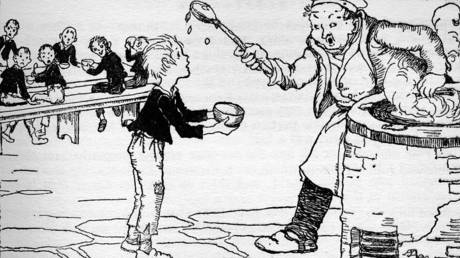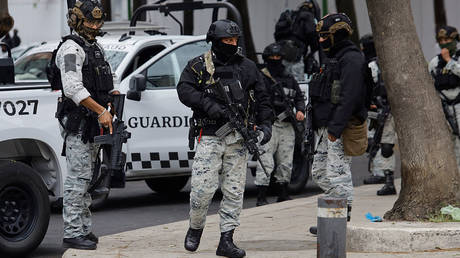
Royal Holloway at University of London reportedly issued trigger alert to protect ‘mental health and well-being’ of Masters-level students
The Charles Dickens classic, ‘Oliver Twist,’ has been hit with a “trigger warning” by a UK university over concerns that its themes of “child abuse,” “domestic violence” and “racial prejudice” could cause “anxiety” and “distress,” the Daily Mail reported.
A Masters-level course on ‘Victorian Literature, Art and Culture’ at the Royal Holloway, University of London, has issued the content warning for the 1838 novel, according to the paper. Details of the alert emerged following a Freedom of Information request by the Daily Mail.
Among the material thought to be deemed as potentially upsetting to some students, the Mail reported, is the chapter featuring the famous workhouse scene, wherein the orphan Oliver is hit by a soup ladle after delivering the memorable line, “Please, sir, I want some more.”
An unnamed spokesman for the university defended the content warning, noting that it was a part of “our responsibility to support the mental health and well-being of our students.” He described it as a “standard and accepted practice within academia.”
But critics pointed to the novel’s enduring popularity, with historian and author Jeremy Black telling the paper that the book was “part of [the UK’s]literary heritage.” He added that the “characteristics of life” explored in such works “can disturb,” but noted that this is “an aspect of maturity.”
READ MORE: Harry Potter book gets trigger warning
Royal Holloway’s content warning is the latest in a series of such trigger alerts introduced by UK universities in recent months, according to the Daily Mail. The paper noted that Salford University had posted similar warnings about another Dickens classic, ‘Great Expectations,’ and about Charlotte Bronte’s ‘Jane Eyre.’
The University of Northampton had done the same for George Orwell’s anti-censorship work ‘1984’ while the University of Chester placed a content note on JK Rowling’s first Harry Potter book, warning that it could prompt “difficult conversations about gender, race, sexuality, class, and identity.”




